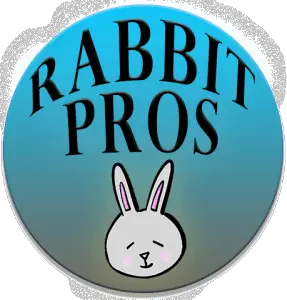Disclosure: We may earn money or products from the companies mentioned in this post.
In researching what is the best diet for a rabbit, I asked my friend Rebecca Turner to help. Rebecca has a diploma in animal care and she is training to be a veterinarian nurse who also happens to be an experienced rabbit breeder and enthusiast. I’m so happy to bring her expertise to this article so you can have confidence when deciding how to feed your bunny.
There is no perfect diet for your rabbit and there are lots of different opinions out there. In this article, Rebecca and I will share the best current information about feeding your rabbit from reliable sources so that you can form your own opinion regarding the best rabbit diet for the long-term health of your bunny.
What Is The Best Diet For A Pet Rabbit?
The best rabbit diet consists of unlimited fresh water, unlimited hay which will make up about 80% of your rabbit’s diet, 15% Salad (Dark Leafy Greens), and 5% of high-quality commercial Pellets or Nuggets. However, the nutritional needs of a rabbit do change at different life stages.
This is the base diet that will help any rabbit thrive, but you should know that your rabbit’s food requirements are going to change as they get older.
Changes In A Rabbit’s Diet As They Age
We’re going to start with discussing the best diets for young bunnies and work our way through the life stages of your pet rabbit and the best diet for each stage of a bunny’s life.
Best Diet For A Baby Rabbit
Rabbits up to 4 weeks old will primarily survive and thrive on milk from their mother and will only occasionally have some of their mum’s food and water as they get older. Bunnies older than 4 weeks but not yet to weaning age of 8 weeks will begin to learn to eat hay and pellets by watching their mother eat.
While baby bunnies are surviving on their mum’s milk, make sure that the nursing mother rabbit has unlimited access to fresh hay and water, and is also offered daily salad (dark leafy greens), and provided with once-daily pellets that are higher in fiber and protein which is vital for the mother and her babies’ health and growth. We’ll dig into this in more detail in just a bit.
As the baby bunnies grow up (4 weeks to 8 weeks), make sure they have unlimited access to fresh hay and water as they learn to eat solid food. During this time, they can eat the same food that their mother eats because their most vital nutrients are being provided by their mum’s milk.
Once the babies are weaned from their mum’s milk, having pellets that are specifically for juvenile (young) rabbits as well as higher protein alfalfa hay is very important for baby rabbits’ growth.
Best Diet For An Adolescent Rabbit
The best diet for adolescent rabbits (3-6 months) includes unlimited fresh water and hay 24/7, small amounts of leafy greens, and pellets designed for young rabbits (juvenile). When feeding rabbits under 6 months, be sure to introduce leafy greens and vegetables very slowly.
Pellets designed for juvenile rabbits are higher in both protein and calcium which are both required by growing bunnies. Such pellets are excellent for bunnies six months old and younger but are not appropriate for adult rabbits as the excess protein and calcium could easily cause obesity and other health problems.
If you’ve visited our Recommended Bunny Gear pages, then you know that our family prefers the Oxbow brand of rabbit feed for the best quality for your money. Here is a link to Oxbow’s Young Rabbit Feed on Amazon.
If you introduce different greens to your young rabbit too fast it can upset their stomach. Remember that your adolescent bunny is learning to eat a more varied diet, and each change in their diet is going to take them a bit to grow accustomed to.
Best Diet For An Adult Rabbit
The best diet for adult rabbits includes unlimited access to fresh water and hay, a handful of a variety of dark leafy greens once per day, access to graze on fresh grass as possible, and 25g of pellets per kg of body weight a day. While all adult bunnies should have unlimited access to hay, the serving size of rabbit pellets depends greatly upon the size of your pet rabbit.
Adult rabbits need less protein and calcium than younger bunnies. This means that we seldom feed alfalfa to adult rabbits and we also avoid pellets that have alfalfa as a primary ingredient. Here is a link to our recommended Oxbow Rabbit Pellet on Amazon.
Best Diet For A Senior Rabbit
Older rabbits (seniors) require free access to both fresh hay and water 24/7, a handful of fresh greens daily, access to grazing if possible, and 25g of pellets per kg of body weight daily. However, many food companies now offer nuggets specifically made for the dietary needs of senior rabbits so providing this would be a good idea.
Best Diet For Pregnant Rabbits
For a pregnant rabbit, you will want to make sure they have fresh water and hay available at all times, a handful of a variety of Greens per day, and 25g of pellets, that contains roughly 18% protein and 14% fibre, per kg of body weight daily. Pregnant rabbits require more protein and fibre to raise the healthiest kits.
Best Diet For Nursing Rabbits?
Nursing rabbits need access to fresh water and hay at all times. At least a handful of a variety of fresh leafy greens daily and pellets once or twice a day that contains 18% protein and 12% fiber. This is so that your mum has enough nutrients so she can produce the milk her baby bunnies need to grow strong and healthy.
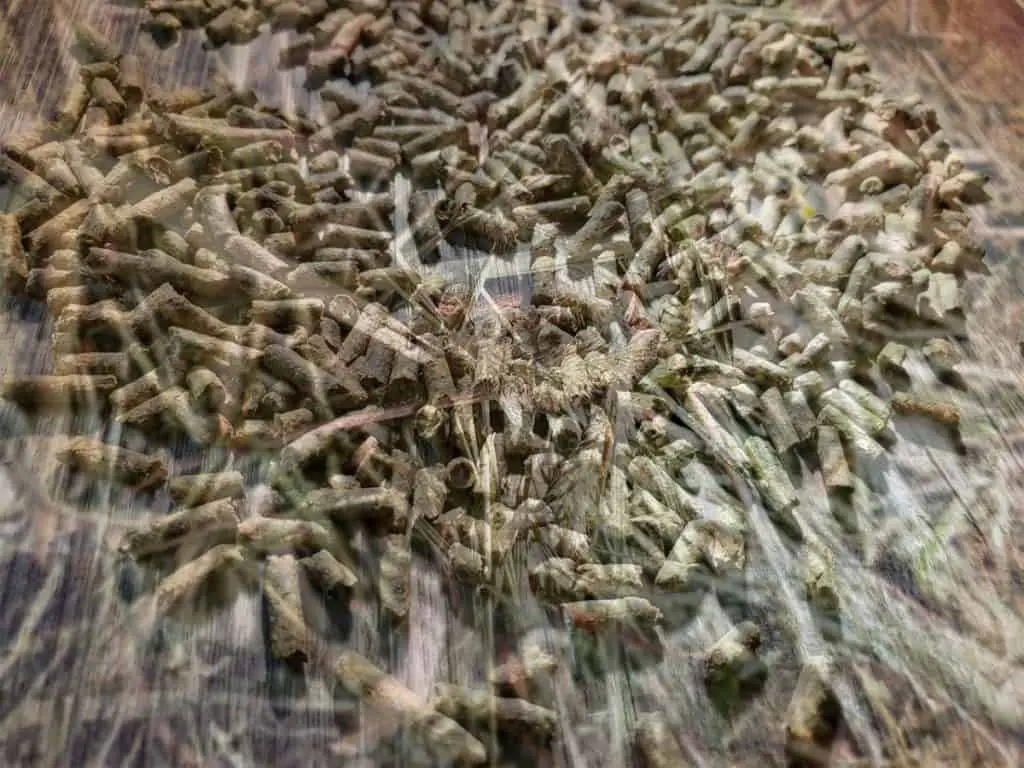
How Much Should You Feed Your Rabbit
How much you feed your rabbit will depend upon the size and life stage of your rabbit. In general, your rabbit should be fed unlimited fresh hay and water. You should also feed your rabbit about a cupful of leafy greens daily as well as about 25 grams of high-quality rabbit pellets per kg of body weight.
Your rabbit should never run out of hay or water. A well-fed rabbit will eat a bundle of high-quality fresh hay approximately the size of its body each day.
Your bunny also requires about a cupful of safe washed leafy green vegetables, herbs and weeds once a day – feed a variety of greens daily, try to give different types so they don’t get bored, and benefit from the varied nutritional content of various greeds.
Your rabbits will also need good quality pellets/nuggets once a day. Quote from RSPCA “Measure 25g (about an eggcup-full) of pellets per kg of your rabbit’s body weight.”
For example, if your rabbit weighs 2 kg then measure two 25 grams of pellets (50g) for their daily serving of pellets. Keep in mind that pellets are not the bulk of a healthy diet for your rabbit. Instead, hay is their primary source of healthy rabbit food.
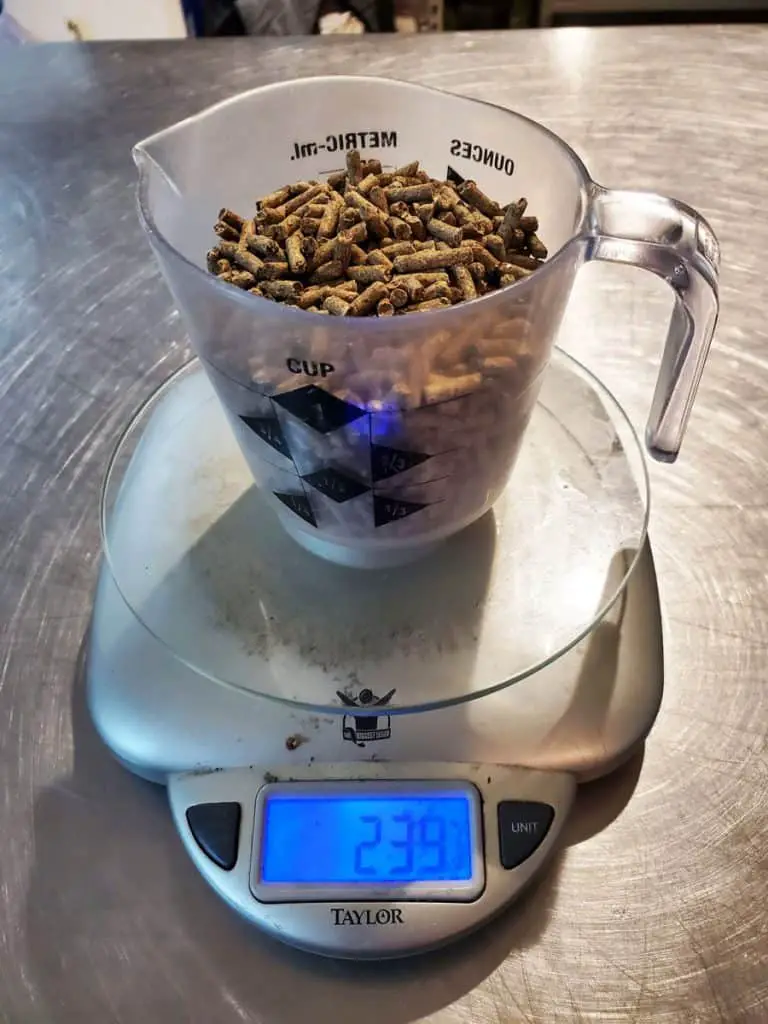
Weight Of A Cup Of Rabbit Pellets
While some brands of rabbit feed give feeding amounts in weight, others give rabbit pellet serving size in volume. So we put a cup of rabbit pellets on a kitchen scale so we all know how much rabbit pellets weigh.
One cup of rabbit pellets weighs 240 grams or 8.4 ounces. That means that one pound of pellets is approximately 2 cups of rabbit pellets.
Table Of Rabbit Pellet Serving Size By Rabbit Size
| Rabbit Weight | Daily Serving By Weight | Daily Serving In Cups |
|---|---|---|
| 1 kg or 2.2 lbs | 25 grams | 1/10 Cup |
| 1.5 kg or 3.3 lbs | 37 grams | 0.15 Cup |
| 2 kg or 4.4 lbs | 50 grams | 1/5 Cup |
| 4 kg or 8.8 lbs | 100 grams | 2/5 Cup |
| 6 kg or 13.2 lbs | 150 grams | 3/5 Cup |
When introducing new foods be sure to introduce those foods slowly and in small amounts. Introduced new foods too quickly can cause stomach upsets for your bun.
Safe Foods For Rabbits
As you know, dark leafy greens are an essential part of a healthy diet for your rabbit. Below is a list of greens and vegetables that are safe to feed your bunny as long as they haven’t been sprayed with pesticides or herbicides.
Rabbit Safe Greens And Vegetables
- Asparagus
- Broccoli
- Brussels Sprouts
- Cabbage
- Cauliflower leaves and stalks
- Celery
- Cucumber
- Kale
- Savoy cabbage
- Spinach
- Baby Spinach
Rabbits also safely eat fruits. However, fruits contain lots of sugar so feed them as special treat only a few times a week.
Rabbit Safe Fruits
- Apple (no seeds)
- Banana
- Blueberries
- Strawberries
- Raspberries
- Pear
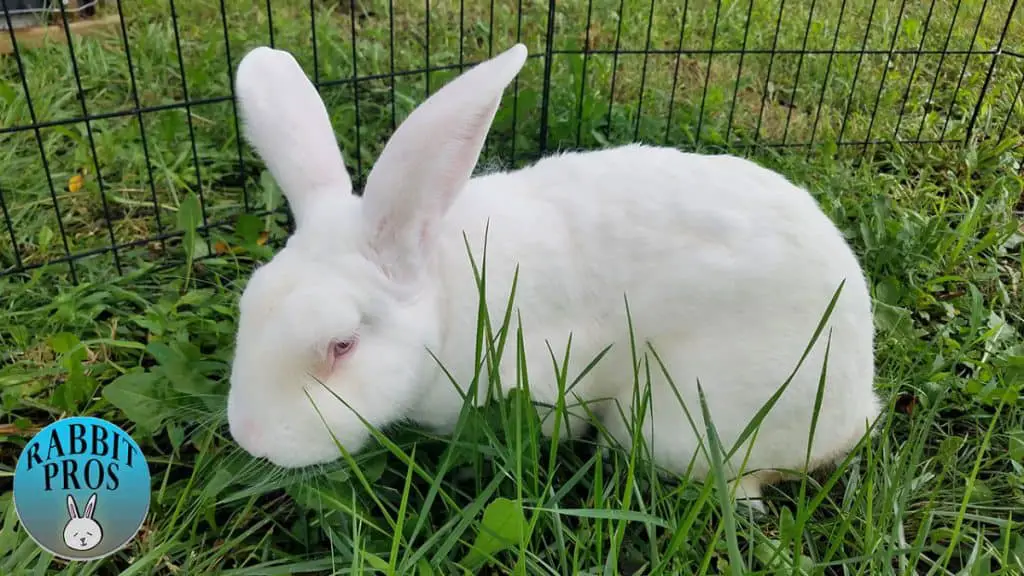
Can Rabbits Eat Lettuce?
Lettuce is not recommended as a rabbit food staple because it has very little nutritional value and contains something called lactucarium which can be harmful to your rabbit in large quantities. There are some types of lettuce that rabbits can eat but it is not 100% safe.[Source]
How Important Is A Rabbit’s Diet?
Your rabbit’s diet is one of the most important parts of her wellbeing.
This is so true that ‘diet’ made it onto the list of the five welfare needs of pets in The Animal Welfare Act of 2006 published by the RSPCA of England. This act bases its recommendations on what rabbits live like in the wild and the goal is to replicate this for your pets so you can have the happiest and healthiest bunnies.
What Are The 5 Welfare Needs Of A Pet Rabbit?
The following is quoted directly from the RSPCA’s Animal Welfare Act of 2006:
“Every pet owner must provide for the following needs of their pets: This following text is a direct quote from
- Health – protection from pain, injury, suffering and disease and treated if they become ill or injured.
- Behaviour – the ability to behave naturally for their species eg. Play, run, dig, jump, fly etc.
- Companionship – to be housed with, or apart from, other animals as appropriate for the species. i.e. company of their own kind for sociable species like rabbits or guinea pigs, or to be housed alone for solitary species like hamsters.
- Diet – a suitable diet. This can include feeding appropriately for the pet’s life stage and feeding a suitable amount to prevent obesity or malnourishment, as well as access to fresh clean water.
- Environment – a suitable environment. This should include the right type of home with a comfortable place to rest and hide as well as space to exercise and explore.”
For your bunny to thrive, you must provide it with the best possible diet, but you also need to consider the other four welfare needs of your pet.
What Should I Look For In Brands Of Rabbit Feed? Hay & Pellets
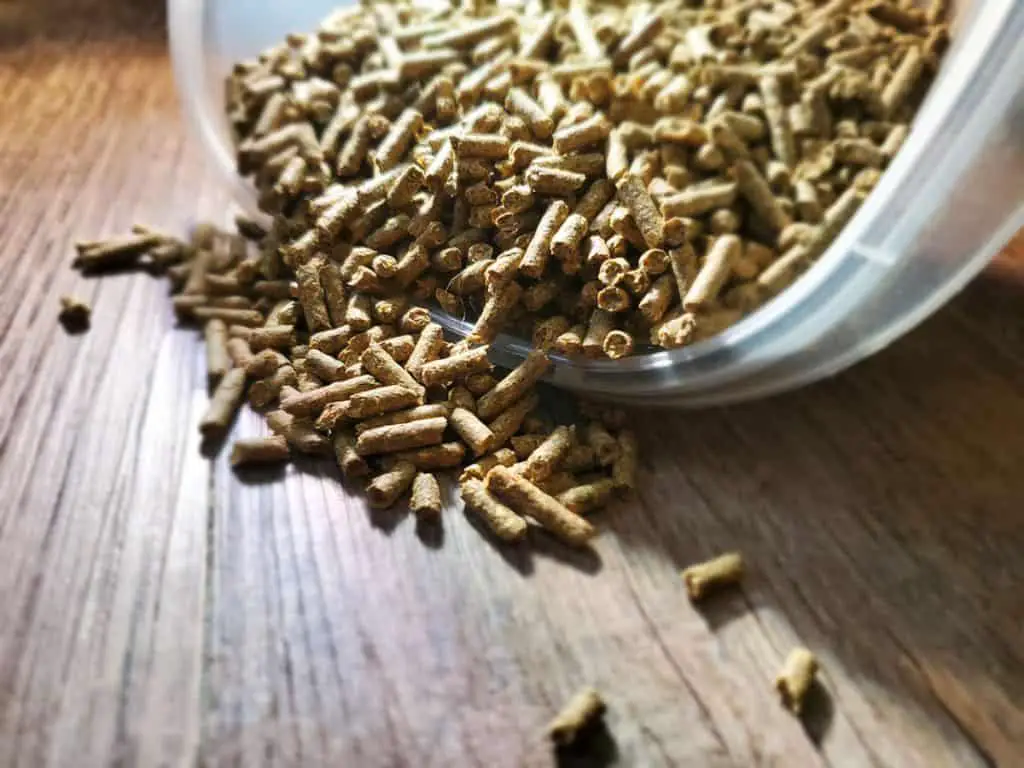
Characteristics Of Quality Rabbit Pellets
When looking for a high-quality rabbit food pellet, start by looking at the nutritional information. Good rabbit pellets have protein of 12 to 16% and fiber of 18 to 25%. Next look at the ingredient list. High-quality rabbit pellets will have Timothy Hay as the first ingredient. Also, look for pellets with few or no unnatural binders.
The nutrition requirements of your rabbit’s pellets, for a healthy adult rabbit, are 12% to 16% of crude protein and 18% to 25% of crude fiber.[Source]
Most of the carbohydrate requirements for rabbits are in the form of fiber. Fiber is important in your rabbit’s diet for maintaining gut health. Fiber is also good for dental health and it increases the time it takes to chew food which improves psychological well-being (this supports one of the five welfare needs, behaviour.)
Rabbits need protein to supply them with energy and support healthy growth, especially when they are younger.
Fat is not necessary as they get their fat from their vegetables.
They also need the calcium level limited to 0.5% to 1%. If a rabbit consumes too much calcium carbonate in their diet it can cause crystals to form in the kidneys, ureters, and the bladder which can become a serious health issue.
Rabbits need macronutrients (protein, fat, and carbohydrates) as these are energy-producing nutrients. Macronutrients are needed in relatively large quantities, depending on the life stage of the rabbit. vitamins, minerals, and water are also important nutrients, these are called micronutrients.
Our family has tried many brands of pellets, and now we use and recommend Oxbow rabbit pellets which you can see on Amazon. There are other high-quality brands, but we found that Oxbow was the best combination of quality and price.
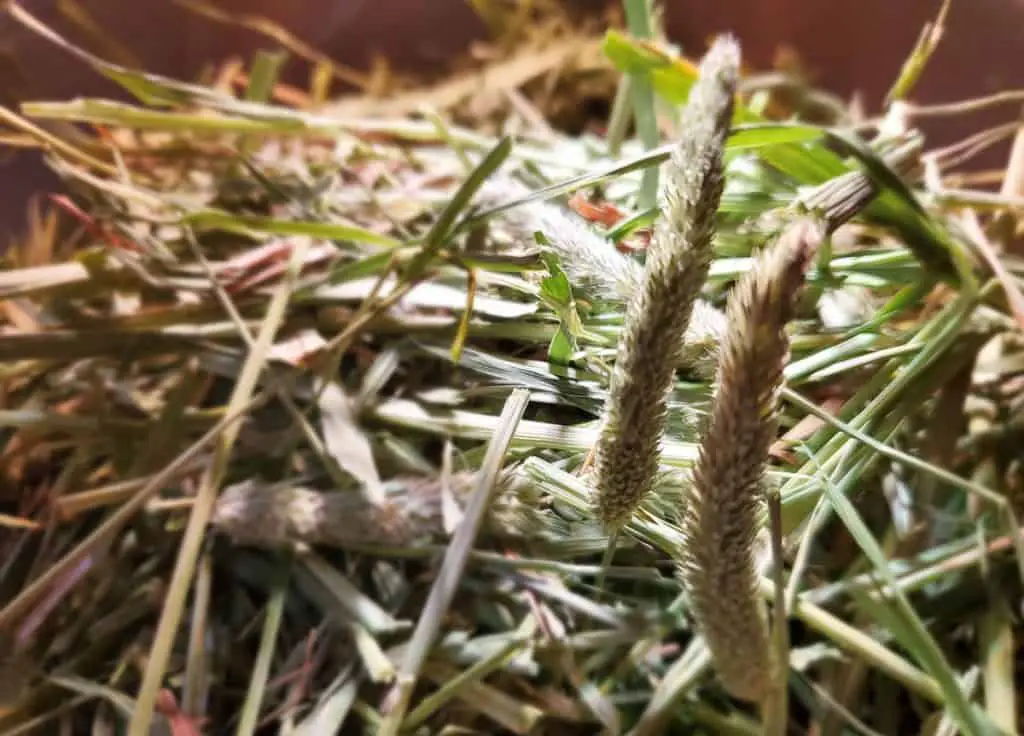
Characteristics Of Quality Rabbit Hay
High-quality rabbit hay is dry, sweet-smelling, green, contain mostly longer strands of hay, and be clean. Clean hay is free from dust, rocks, and mold. Quality hay will encourage your bunny to eat more hay make it easier to clean up hay messes.
The RSPCA clearly states that rabbits need good quality, fresh grass hay available at all times and should have access to growing grass for your rabbit to graze. Hay is the foundation of a healthy rabbit diet.
The Rabbit Welfare Association recommends good quality grass hay that should be dry, sweet-smelling, and free from grit, dust, and mold. Timothy hay is the most common high-quality choice for rabbit hay.
There are other types of hay that are also good rabbit hays, but the staple for your rabbit should be timothy hay. It is important to understand that alfalfa hay is not grass hay and is much higher in both protein and calcium than grass hay. Alfalfa is so rich in these nutrients that it should only be fed to young growing rabbits or to adults as treats.[Source]
Eating hay is essential for your rabbit’s health, but rabbits can be really picky about the type and brand of hay they will actually eat. Our family feeds and recommends Oxbow Timothy Hay which you can see on Amazon.
Your Rabbit Friends,
~ Stacey & Rebecca
